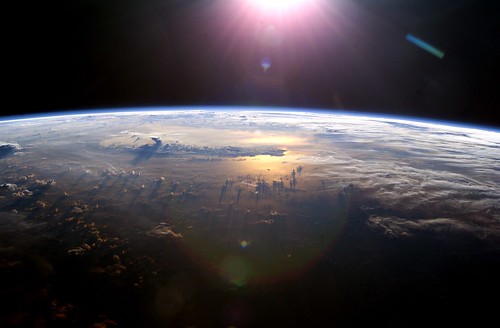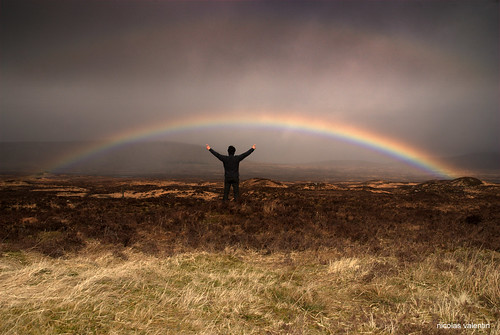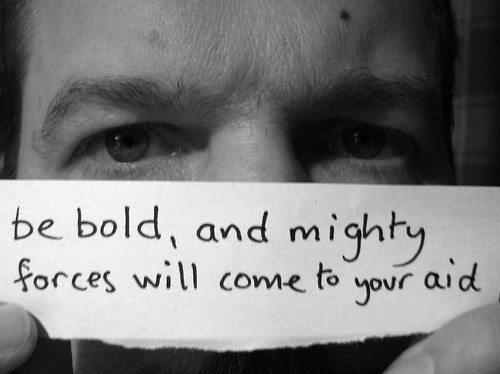
Have you ever noticed how as soon as we name something, it becomes demystified?
Judeo-Christianity tells the story of Noah, building an ark for years and telling people that it was going to rain. The story says that it had never rained on the earth before and that up to this point, the earth was watered with a mist that came up from the ground.
If it had never rained before, I sincerely doubt that a word for "rain" existed in ancient times in any language. It is therefore easy to imagine Noah saying "I'm building this ark because water is going to fall from the sky and flood the world."
When you say it like this, the warning is even more unbelievable. The event becomes veiled in a wording that appears to be mystical and supernatural.
We have words for all sorts of things that otherwise look miraculous when you think about what they really mean:
The miracle of life: "fertilization"
Caterpillar turns into a butterfly: "Metamorphosis"
The rusting process: "oxidation"
The power that keeps us on terra firma: "Gravity"
A force that permeats the universe: "Radiation"
A series of colored lights forming an arc: "Rainbow"
Any repeated connection of events: "Scientific Law"
Lights in the heavens: "Stars"
G.K. Chesterton wrote:
It is the man who talks about “a law”
that he has never seen who is the mystic. Nay, the ordinary scientific man is strictly a sentimentalist.
He is a sentimentalist in this essential sense, that he is soaked and swept away by mere associations.
He has so often seen birds fly and lay eggs that he feels as if there must be some dreamy, tender
connection between the two ideas, whereas there is none. A forlorn lover might be unable to
dissociate the moon from lost love; so the materialist is unable to dissociate the moon from the
tide. In both cases there is no connection, except that one has seen them together. A sentimentalist
might shed tears at the smell of apple-blossom, because, by a dark association of his own, it reminded
him of his boyhood. So the materialist professor (though he conceals his tears) is yet a sentimentalist,
because, by a dark association of his own, apple-blossoms remind him of apples. But the cool
rationalist from fairyland does not see why, in the abstract, the apple tree should not grow crimson
tulips; it sometimes does in his country. - Orthodoxy pg 29
So what is it about our human nature that causes us to think that because we might name something, or even call it a law, that it is less mystical as a result?
As Shakespeare once said, "A rose by another name still smells the same." Is water falling from the sky any less miraculous if it is simply called "rain"? Is a meteriologist's explanation of the conditions which produce rain any different than the fairy godmother's explanation of the existence of Cinderella's glass slippers?
Is a scientist's explanation of why the earth has a gravitational force pulling us down, any less miraculous than the theologian's explanation of why faith in Christ's resurrection will raise us up?
As a Christian, I believe that the Bible is the Word of God. I also agree with Martin Luther who said that the Bible is God's "baby talk" to us. In the course of Him communicating to us in a way that we can understand, the Word is demystified to the degree that it becomes more propositional.
This demystified Word presents Jesus Christ as the son of God, who lived like no man has ever lived before or since, who offered Himself as a sacrifice for mankind, and did the ultimate thing in coming back from the dead. That sacrifice and resurrection gives Christians hope to share in the crucifiction of sin in our lives via grace and the promise of new life in being "born again" here and after our physical deaths.
But when I say it like this, the story sounds more like a formula than the miracle that it is.
But as I meditate upon these truths, the abstractions that naturally accompany the meditation process seem to melt the propositional nature of this revelation away.
What I'm left with is the story of God reaching down to man in his despair and need, pulling us out with the ultimate expression of love, giving us the freedom that all of us long for, but few find.
I don't believe it is coincidental that Jesus Christ is called the Word of God and is described as being humble.
The irony of this coincidence is that as the Word is humbled, its power increases, the story unfolds and transcends the mind, also reaching the heart.





